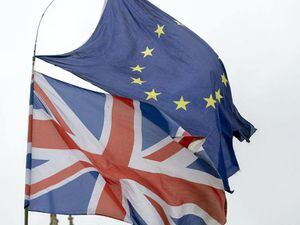A right to be sad
IT IS not often I agree with Deputy Peter Ferbrache when he suggests what I’ve said in debate is irrelevant to the matter in hand, but on Sunday 27 December he was spot on to describe the first three minutes of my speech as just that. I just couldn’t help myself. More on that shortly.

It was only the second time in my long States service that the Assembly has sat between Christmas and New Year, and definitely the first time it has sat on a Sunday. Nothing less momentous and historic than determining Guernsey’s future relationship with the EU, at least for the limited purposes of trade in goods and fishing rights, would have brought about such an unseasonal States sitting.
In fact the parliaments of all four Channel Islands jurisdictions met on that day and all four reached the same conclusion – to accept the deal on offer, which had been negotiated on our behalf by the UK. We would have been fools not to. After all, the option of varying that deal wasn’t on the table and the consequences of saying ‘No’ would have been pretty grim.
Goods exported from Guernsey to the EU would have attracted tariffs and even those exported to the UK would have had to wade through red tape to ensure they were not re-exported to the EU in a way which avoided those tariffs.
Our fishermen would also have had to pay tariffs on their catches landed in France, as well as giving days’ notice of their intention to do so. Thanks to the new agreements, those days will be reduced to hours and the fish will be tariff-free. There has even been a modest gain in terms of control of our territorial waters.
So has everything we enjoyed under Protocol 3 been preserved? Not quite. There will be less extra paperwork than under a ‘no-deal’ scenario but there will still be some. Exporters will have to get used to completing complex customs declarations where there was no need to previously. Plus in future there will always be the sword of Damocles, contained in the agreement, of ‘proportionate retaliatory measures’ if either party is deemed to have diverged too far on ‘standards’.
That said, in respect of both trade in goods and fishing rights this was as good as it was ever likely to get under Brexit, so well done to Guernsey’s team behind the scenes, and a genuine thank you to the UK negotiators.
I suppose my main sadness, and what brought about my uncharacteristic wandering from the matter in hand, was what was absent from the agreement. Our wider relationship with Europe, and in particular free movement, in both directions.
One of the strangest comments during the debate was from Deputy Prow expressing his pleasure that the new arrangements, post-transition, would do away with the ‘islander’s stamp’ in some Guernsey residents’ passports. Basically those without a parent or grandparent born in the UK/EU.
While I fully share his frustration that a relatively small minority of islanders have not, hitherto, enjoyed the automatic right to live, work, study, or whatever, within the EU, I really fail to see how the rest of us losing that right too is anything to celebrate. It is a bit like saying we are making things better for blind people by all agreeing to put on blindfolds.
As for the freedom for EU citizens to come to Guernsey, previously provided by Protocol 3, I also regret that loss. Not because I want Guernsey’s population to grow but because the message that Europeans were treated equally to UK citizens under our population control regime was a relatively welcoming one.
Of course I’m delighted that it seems (although the jury is still out) that we will be allowed to operate our own, more liberal, rules for allocating work permits from next year, but it hardly replaces an automatic right to reside. It seems grudging at best.
I think creating a community of nations where people were free to travel, work, trade, do business and live as if within their own nation was one of the most inspirational developments of the post-war period. I was an adolescent when the UK joined that club, in the form of the EEC, and I thought it signalled a welcome step towards internationalism. Certainly with local decisions being taken as locally as practically possible, but also where elements of sovereignty were shared for the greater gain of all parties.
I fully accept that a slim majority of UK voters disagreed and I respect that outcome.
I did from the day after the referendum (thanks a lot, David Cameron) despite the odd utterly irrational thought that there could somehow be an 11th hour change of heart.
What I had hoped, though, was that the UK might decide on a closer post-divorce relationship with the EU, a bit like the one which Teresa May kept putting before Parliament, and which would have been in place now if Labour had swallowed hard and supported it.
Instead we are seeing a very hard divorce, with a very thin deal, where the relationship is primarily about the two sides flogging each other stuff tariff-free. And has the UK won back control which seemed so crucial to the hard Brexiteers? Yes and no. It can now set its own rules and standards, but as soon as it uses that freedom to any significant extent it risks losing its crucial tariff-free access to the single market. Pyrrhic doesn’t begin to describe it.
Not only that, but it makes the break-up of the UK more likely. After all, Northern Ireland has already been pushed half-way out of the door in respect of customs arrangements. While a united Ireland may have always been, eventually, an historical inevitability, and not such a dreadful prospect, Scotland leaving the UK would be sad.
I admire the Scots’ sense of self-identity and understand their yearning for self-governance. As a staunch defender of Guernsey’s autonomy, how could I not? I just think the ‘devo-max’ option for achieving this would be far better than the siren call of nationalism.
My real fear is that the hard Brexit we are seeing, and even more the jingoistic rhetoric of its most enthusiastic supporters, will drive moderate opinion in Scotland towards the nationalist cause. I only hope the UK’s high-profile ‘Minister for the Union’ is up to the challenge.
All of that said, I am a democrat. Guernsey rightly had no voice in determining the future UK-EU relationship. And I accept that a slim majority of UK voters rejected the sort of internationalism which I found so inspiring back in the ’70s and still do today.
So I have no right to complain, but I do have a right to be sad. Particularly for the rights and freedoms that younger generations of islanders are losing.





